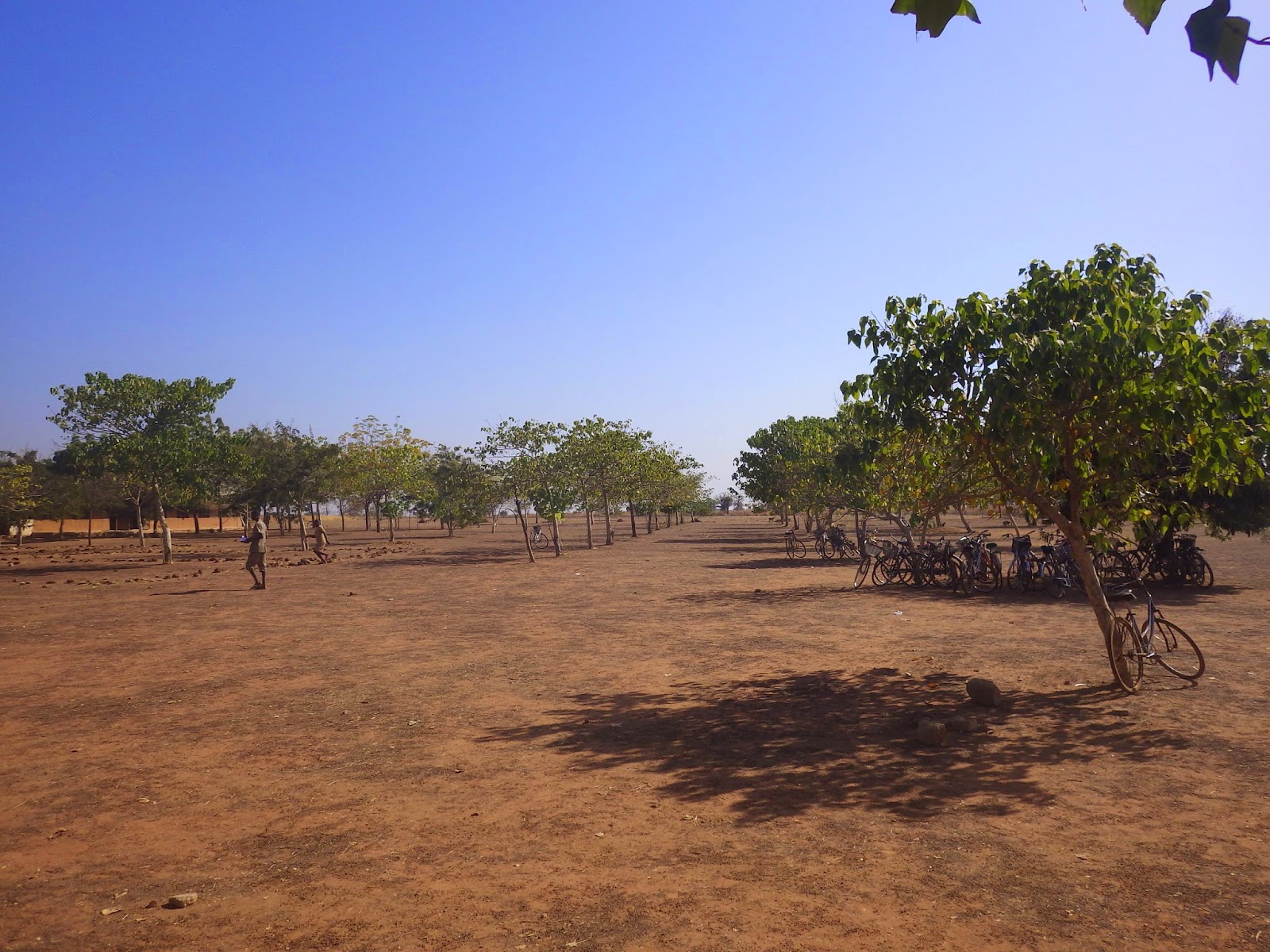Bonjour tout le monde,
Where to begin? I write to you from Natitingou. A city built in a
valley between the Atacora Mountain Range. Life is slower in the
north, people speak softer, and there are less mosquitos, drier,
sleepier. This Sunday morning, all of the volunteers posted in the
department (Beninese equivalent of a state) of Atacora and Donga have
voyaged to the north. Our baggage is on its way, and as you can
imagine, it is difficult to move thirteen people across the country.
As I mentioned, I am overdue in communication. Let's go back a month a
half.
Two Weeks in Dassari
On the back of Chabbi's motorcycle, with the morning sun low on the
horizon, the bush speeds by. Farmers tended their plots of cotton,
manioc, maize, gumbo, riz, and igname . Baobabs erupted from the land
and mountains littered the plains, rising like whales emerging for
air. A cool, morning air rushed into my helmet, and it smelled rich
and green. We were headed towards Dassari on the gadron to Burkina
Faso.
Dassari is a small village 30 km from Tangueieta, a small city at the
corner of the Parc Penjari and the Atacora Mountain Range and 30 km
from Porga, the border village between Benin and Burkina Faso. The
population is undefined, as a proper census is difficult to conduct,
but I have heard from 12,000 to 24,000 in the village limits. If those
numbers are accurate, surely, half of the population is under 18. (The
country is full of children. It is normal for a family to have 5, 7,
15 children. This is for a variety of reasons—as a friend's host papa
described it, Africans are very "social".) There is one paved road
connecting Burkina Faso and Benin, the gadron (paved road), and it
splits the village in half.
For my two-week stay, I rested with the brother of Dassibou Kassa, my
official host family, Justin Kassa. Justin is a part-time professeur
de sport, veterinarian, and agricultural educator. When I first met
him, on the morning of August 2nd, he was drinking Sodjebai, palm wine
liquor—Beninese moonshine. By a wonderful coincidence, the same day I
arrived was the Fête de Dassari, held on the Saturday after the Nation
Fête de Independence. I was escorted all over town, meeting a chef or
patron here and a CA there, meeting all of the important men of power,
and it was one big party all over town. People were dancing and
drumming and eating seasoned pork. I met my director of the CEG
(principal of the school) in which I will be working. He is a former
radio broadcaster and has a voice of honey and is a true orator. He
loves formal presentations, so the day was full of "je voudrais
presenter mon cher collegue…" I tried to keep up with my director for
the night, but he more or less drank me under the table, and I fell
asleep not long after sunset.
For the next two weeks, I spent time traveling around the commune
(Beninese equivalent of county) meeting important members of the
community (in a more professional setting), introducing myself,
explaining why I am here, goals of my work in Dassari. I am the first
volunteer at Dassari, so I will spend much time explaining what the
Peace Corps is all about, what is my role for Dassari, etc. Luckily,
the TEFL program has a very clear objective: a volunteer has a primary
job teaching English at the local CEG (college d'enseignment generale,
or, public school). Other than that, a volunteer is expected to both
work improving the quality of pedagogical techniques employed by the
Beninese teachers and improve the academic community en generale, by
working with APE (association des parents et enseigneurs, PTA).
Chabbi is my homologue and we will be team-teaching.
The Peace Corps focuses a lot of training upon what it calls,
cultural integration. This manifests itself in a variety of ways, e.g.
language, dress, habits. PC is interested in seeing volunteers making
efforts of assimilate into the culture, adopt the mode de vivre, and
begin to build relationships. I have never has a job that has so
actively encouraged me to make friends. I may have had this
conversation with you, reader, before I came to Benin about the
"labor" of community building and development work. The cultivation of
relationships, understanding of lives, priorities and needs, appears
to be a necessary foundation for enriching the life of a community. I
find my work here to be so exciting and natural to my general
interaction with people, sometimes it doesn't feel like "work". (That
is a whole other topic of discussion, general cultural understanding
of labor and work.)
Some disorganized notes:
There is an excellent millet beer called Tchouk (pronounced chu-ku-tu
or chuke for short)), sort of like a cider. Everyday at the marche,
you can sit down for a moment and drink a calabash of Tchouk for
50CFA. It taste a little like a rich, acidic, thick cider. It served
as a crucial element of my community integration (i.e. sitting around
with my Byali tutor, drinking Tchouk, and practing Byali).
I am learning Byali, the local language of the Berba people in the
region. It is a really fun language, people are always surprised to
see a white person speak it. (I also have to get a French tutor as I
did not successfully reach the minimum French level for post-training
[though I am suspect as to the accuracy of my final test, it is not a
battle worth fighting])
There are so many children and they are all so funny.
Everyone thinks I am Muslim because: (1) Razak or Razaki is a very
popular Muslim name and (2) my beard is very big.
Used a Lil' Wayne song that one of my students really liked as an
opportunity to practice English. (Mirrors feat. Bruno Mars)
Tchao Tchao



